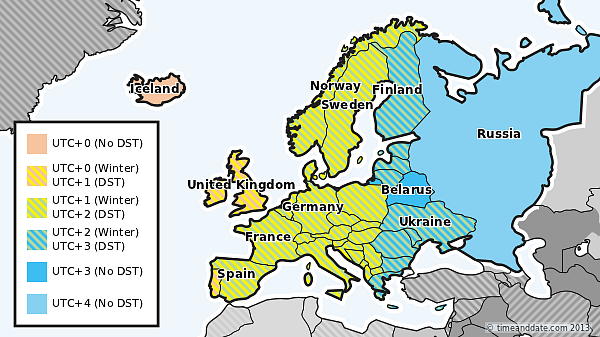March 31, 2013: Europe Starts Daylight Saving Time
Most European countries will begin observing Daylight Saving Time (DST) in the early morning of Sunday, March 31, 2013, when clocks will be
advanced by one hour. The precise time of the switch differs from country to country.

Time Zones and DST in Europe: The striped areas will begin using DST on March 31, 2013.
US & Canada start DST Sunday, March 10
Australia & New Zealand end DST on April 7, 2013
Where is DST observed?
Clocks will be advanced by one hour in:
- all countries in the European Union (EU) - including the United Kingdom, France, Germany, Spain, Italy
- most other European countries - including Norway and Switzerland
The following countries will not switch to DST:
DST dates worldwide - first half of 2013
DST dates worldwide - second half of 2013
When will clocks be advanced?
The DST period in Europe runs from 01:00 Coordinated Universal Time (UTC) on the last Sunday of March to 01:00 UTC on the last Sunday of October every year. As Europe spans 5 time zones, the local times for the switch vary:
| Time Zone | Local Time of DST Switch | Notes |
|---|---|---|
Greenwich Mean Time (GMT), observed in countries including the United Kingdom and Ireland; UTC offset (Standard Time / DST): |
DST starts at 1am (01:00) local time, when clocks move one hour forward to 2am (02:00). |
The United Kingdom and Ireland do not observe GMT during daylight saving time. |
Central Europe Time (CET), observed in countries including France, Germany, Austria, Italy, Switzerland, Netherlands, Norway, Poland, and Spain. UTC offset (Standard Time / DST): | DST starts at 2am (02:00) local time, when clocks move forward to 3am (03:00). |
|
Eastern European Time (EET), observed in countries including Bulgaria, Estonia, Finland, Greece, Latvia, Romania, Turkey, and Ukraine. UTC offset (Standard Time / DST): |
DST starts at 3am (03:00) local time, when clocks move forward to 4am (04:00). |
Ukraine may abolish DST from 2013 onwards. |
Eastern European Summer Time (EEST), observed year-round in Kaliningrad (Russia) and Belarus. UTC offset: |
No DST switch |
|
Most of the western parts of Russia are in the Moscow time zone, Moscow Standard Time (MSK). UTC offset: |
No DST switch |
Russia currently observes DST year-round. |
More details about Europe’s time zones and DST schedule, as well as a brief history of DST in Europe can be found on our website.